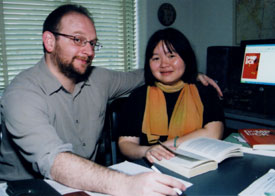Berkeleyan
Sharing a Vietnamese classic with the West
Faculty couple’s literary translation of Dumb Luck has brought a few surprises
![]()
| 04 February 2004
| |  Historian Peter Zinoman and his wife, Cam Nguyet Nguyen, spent three years translating Dumb Luck, a novel recently praised by the Los Angeles Times. Joanne Connelly photo |
Historian Peter Zinoman and linguist Cam Nguyet Nguyen were not thinking about mainstream recognition when they set out to translate a novel by an internationally obscure Vietnamese writer, Vu Trong Phung.
The work, called So Do, had had a remarkable history and enthusiastic following since it was first published in 1936-37 as a newspaper serial; its depiction of late-colonial-era Vietnam was of keen interest to Zinoman, a specialist in Vietnamese and Southeast Asian history. So was its prolific author, sometimes compared to Balzac, whose writing Zinoman had discovered in the 1990s while researching the French colonial prison system. Nguyen, for her part, grew up in Hanoi (where the novel is set), majored in English language and literature at Hanoi National University, and had translated several works from Vietnamese to English and others (including E.B. White’s Charlotte’s Web and much of Studs Terkel’s Working) from English to Vietnamese.
There were ample scholarly and literary reasons, then, for the Berkeley faculty couple to bring Phung’s novel into English. One was to extend the reach of a literary gem. Dumb Luck, as they translated the title, follows the fortunes of Red-Haired Xuan, a “little guy” who — through street smarts, chutzpah, and inexplicable luck — climbs the rungs of French Indo-Chinese society. Many regard Phung as Vietnam’s greatest 20th-century writer and this novel — with its funny dialogue and characters and its scathing satire on the craze for modernization in Phung’s era — as his best work.
Nguyen, who teaches Vietnamese in the South and Southeast Asian Studies department in the College of Letters & Science, is among these fans.
“It is one of the greatest books of modern Vietnamese literature,” she says of the novel. “It was banned [by the Communist authorities] during my childhood and republished in 1986 [after the ban was lifted] by 20 different publishing houses. I knew it through my parents.”In Vietnam, scholars and reading public alike hold Dumb Luck in high regard; its language and characters have crept into everyday life, Zinoman notes. Even people who have never read the book — or seen its recent transformation to a play, or the successful Vietnamese movie version, now on DVD — may refer to a spoiled child as a “Little Master Blessing” or a sexually aggressive woman as a “Madame Deputy Customs Officer.”
Modus operandi
In the winter of 1997, Nguyen and Zinoman began their work together on Dumb Luck. The first time through, they worked literally side by side in their East Bay home, doing a rough translation of each scene from Vietnamese into English. Later they took turns going over each draft with a fine-toothed comb — Nguyen checking the translation sentence by sentence against the original Vietnamese, Zinoman having the last word on English vernacular.
“You realize that the translator has huge power,” says Nguyen of the process. “You make so many choices.”
One of their goals was to convey the book’s humor — which stands in contrast to most of the Vietnamese literature that has been translated into English.
“Even though it’s had a rough time in the 20th century, Vietnam is a resilient and lively place,” notes Zinoman, who first visited the country as a graduate student more than a decade after the U.S. military left in April 1975. “We wanted to convey that feeling — of a people not bemoaning their fate, but making jokes about it.”
A lot of the book’s humor, however, is based on Vietnamese puns and the mangled French of social-climbing Francophiles. Translating those into English — without weighing down the text with scholarly commentary — was no small feat, they found.
“You can’t footnote a joke,” Zinoman explains. Instead, you “fish around and find parallels” that do justice to the original.
Unflagging enthusiasm
It took the couple three years, working in fits and starts, to complete the translation, along with a long, informative introduction by Zinoman. Mission accomplished, they sent Dumb Luck off to the editors at University of Michigan Press — with hopes of their book being assigned in college classes, but “low expectations” for popular attention.
It came as a surprise, then, when reviews of their translation started cropping up: in the Far Eastern Economic Review, the Vietnamese-American press, and then the Los Angeles Times — which in December 2003 named the English translation among the year’s best books. That’s unusual attention for an academic-press book — attention that Nguyen explains as (what else?) “dumb luck” of their own.
“It’s great to be recognized along with the new translation of Don Quixote and a Susan Sontag title,” says her husband. “We’re thrilled to see an internationally obscure Vietnamese writer in such august literary company.”
Though translators sometimes get sick of a book by the time they’re done working with it, not so with Dumb Luck or its author, they say. Zinoman, in fact, is writing a full-length literary biography of Phung — who penned eight novels, seven plays, scores of newspaper articles, and five nonfiction books before his death at age 26. Nguyen teaches the original to her advanced Vietnamese students.
“This novel covers so many topics — freedom of love, fashion, the fate of old people in westernized societies, sport, women’s virginity, adultery, life on the street,” she says. “It’s so good that you don’t feel guilty assigning it to your students.”
Dumb Luck has just had a second printing; copies are available at the Cal Student Store.

